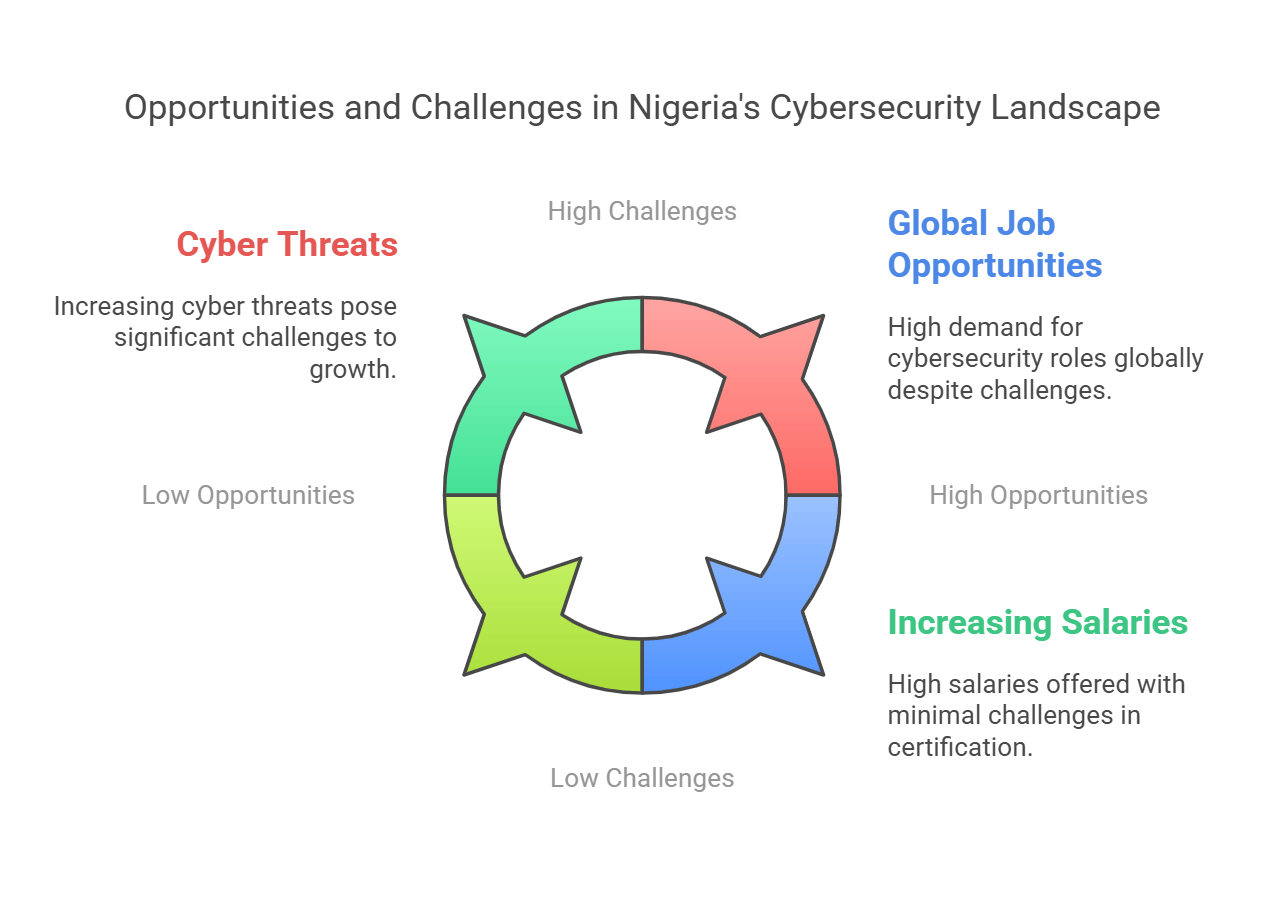Table of Contents
- Why Cybersecurity Certification is Essential in Nigeria (2025 Perspective)
- 1. Rapid Digital Growth & Cyber Threats
- 2. Global Job Opportunities & Remote Work
- 3. Increasing Salaries & Job Security
- Top Cybersecurity Certifications to Pursue in Nigeria (2025 Update)
- How to Get Cybersecurity Certification in Nigeria
- Benefits of ACSMI Cybersecurity Certification for Nigerian Professionals
- FAQs About Cybersecurity Certification in Nigeria (2025 Edition)
- Final Thoughts
Cybersecurity is now a critical concern for individuals, businesses, and government agencies worldwide. With the rise of digital transformation, African nations—especially Nigeria—are experiencing an increasing need for skilled cybersecurity professionals. As cyber threats grow in sophistication, professionals must equip themselves with industry-recognized certifications to tackle modern security challenges.
Cybersecurity Certification in Nigeria offers professionals the expertise required to protect sensitive data and mitigate cyber risks. Whether you are a fresh graduate, an IT professional looking to specialize, or a business leader seeking to understand security risks, obtaining the right certifications can enhance your career and open global opportunities.
For professionals looking to expand their expertise beyond Nigeria and explore global career opportunities, check out Top Cybersecurity Certifications to Advance Your USA Career to discover the most recognized credentials that can help you succeed in the U.S. job market.
Why Cybersecurity Certification is Essential in Nigeria (2025 Perspective)

1. Rapid Digital Growth & Cyber Threats
Nigeria’s digital economy has seen massive growth, with fintech, e-commerce, and digital banking dominating the market. However, this expansion has also led to increased cyber threats such as:
-
Phishing attacks targeting financial institutions
-
Data breaches in government and corporate sectors
-
Ransomware threats disrupting businesses and critical infrastructure
To combat these risks, cybersecurity professionals must acquire relevant certifications that provide knowledge of security frameworks, risk management, and attack prevention.
2. Global Job Opportunities & Remote Work
The demand for cybersecurity professionals is skyrocketing globally. With the right certifications, Nigerian experts can qualify for:
-
Remote cybersecurity jobs with international firms
-
Freelance cybersecurity consultancy
-
Roles in multinational tech companies
Certifications like CompTIA Security+, Certified Ethical Hacker (CEH), and Certified Information Systems Security Professional (CISSP) enhance credibility, allowing professionals to compete in the global job market.
3. Increasing Salaries & Job Security
Certified cybersecurity experts in Nigeria earn significantly more than their non-certified counterparts. Industries such as banking, telecom, oil & gas, and healthcare offer lucrative salaries to professionals with specialized security skills. Investing in a certification not only strengthens your knowledge but also improves your financial stability.
Top Cybersecurity Certifications to Pursue in Nigeria (2025 Update)
Knowing which certifications to pursue can help you align your skills with industry needs. Here are the top choices for Nigerian professionals in 2025:
1. CompTIA Security+
This globally recognized entry-level certification covers cybersecurity fundamentals, including:
-
Threat identification and response
-
Risk management
-
Security incident handling
Ideal for beginners, it provides a strong foundation for further specialization.
2. Certified Ethical Hacker (CEH)
For those interested in penetration testing and ethical hacking, CEH teaches:
-
Network penetration testing techniques
-
Vulnerability assessments
-
Ethical hacking methodologies
3. Certified Information Systems Security Professional (CISSP)
A high-level certification designed for cybersecurity managers and specialists. It covers:
-
Security architecture and engineering
-
Risk management
-
Compliance frameworks
4. ACSMI Cybersecurity Certification (Tailored for Nigerian Professionals)
ACSMI offers 400+ modules catering to various cybersecurity roles. The program provides:
-
Beginner-friendly courses
-
Advanced cybersecurity specializations (IoT security, cloud security, digital forensics)
-
Hands-on training with real-world cybersecurity scenarios
Why ACSMI? It aligns with Nigerian security challenges and offers flexible payment plans, making it accessible for local professionals.
How to Get Cybersecurity Certification in Nigeria
Step 1 – Research & Choose the Right Program
Define your career goals and select the most relevant certification. If you're new to cybersecurity, CompTIA Security+ is a great starting point. If you want to specialize, CEH or CISSP could be better options.
Step 2 – Enroll & Begin Studying
Many certification courses are available online or at local training centers. Nigerian professionals can choose between:
-
Self-paced online courses (ideal for working individuals)
-
Instructor-led classes (for interactive learning)
Step 3 – Gain Hands-On Experience
Theory alone isn’t enough—practical skills are crucial in cybersecurity. Use:
-
Online labs for penetration testing
-
Cybersecurity competitions & hackathons
-
GitHub & cybersecurity forums to practice real-world scenarios
Step 4 – Take the Certification Exam
Once prepared, register for the exam. Many international certifications have accredited testing centers in Lagos, Abuja, and Port Harcourt.
Step 5 – Maintain & Advance Certifications
Cybersecurity evolves rapidly. Professionals should:
-
Keep certifications up to date (some require renewal)
-
Pursue continuous learning through advanced certifications
-
Stay informed on the latest cyber threats and security trends
Benefits of ACSMI Cybersecurity Certification for Nigerian Professionals
Customizable Learning Paths
ACSMI offers a flexible curriculum that allows learners to focus on specific cybersecurity fields such as:
-
Cloud security (essential for fintech and banking sectors)
-
IoT security (crucial for smart city initiatives in Nigeria)
-
Digital forensics (important for law enforcement and government agencies)
Real-World Training & Simulations
Unlike many theoretical courses, ACSMI integrates:
-
Hands-on labs with real cybersecurity challenges
-
Case studies based on Nigerian cyber threats
-
Live hacking simulations for penetration testing practice
Global Recognition & Local Relevance
ACSMI certifications provide international credibility while addressing Nigeria’s unique cybersecurity landscape.
FAQs About Cybersecurity Certification in Nigeria (2025 Edition)
1. How much does cybersecurity certification cost in Nigeria?
The cost depends on the certification level and mode of learning. Here’s a general breakdown:
-
CompTIA Security+ – ₦200,000 – ₦400,000
-
Certified Ethical Hacker (CEH) – ₦600,000 – ₦1,000,000
-
CISSP – ₦1,000,000+
-
ACSMI Certifications – Affordable payment plans available
2. Can I complete a cybersecurity certification online?
Yes, many programs offer online training. ACSMI provides virtual labs and live instructor-led sessions to ensure practical learning from home.
3. Which cybersecurity certification is best for beginners?
-
CompTIA Security+ – Best for entry-level professionals
-
ACSMI Entry-Level Modules – A great alternative with localized content
4. Is there demand for cybersecurity experts in Nigeria?
Yes, industries like fintech, healthcare, and government agencies actively seek cybersecurity professionals to secure sensitive data.
5. Does Nigeria offer dedicated cybersecurity degree programs?
While some universities provide cybersecurity courses, most professionals opt for international certifications like CISSP, CEH, and ACSMI to gain global recognition.
Final Thoughts
As Nigeria’s digital transformation accelerates, Cybersecurity Certification in Nigeria is more important than ever. Whether you're looking for career advancement, higher salaries, or global opportunities, investing in certifications like CompTIA Security+, CEH, CISSP, or ACSMI can position you as a sought-after cybersecurity expert.
Now is the time to enhance your skills and secure your place in Nigeria’s growing cybersecurity landscape.

Leave a Reply